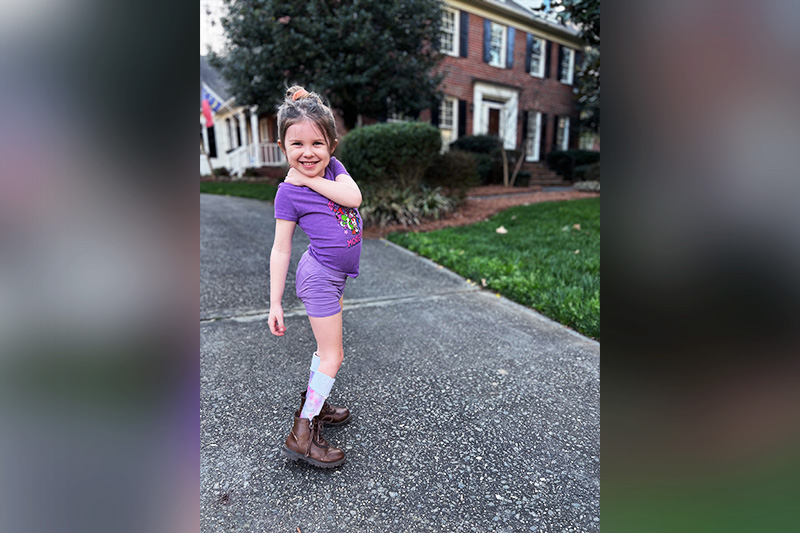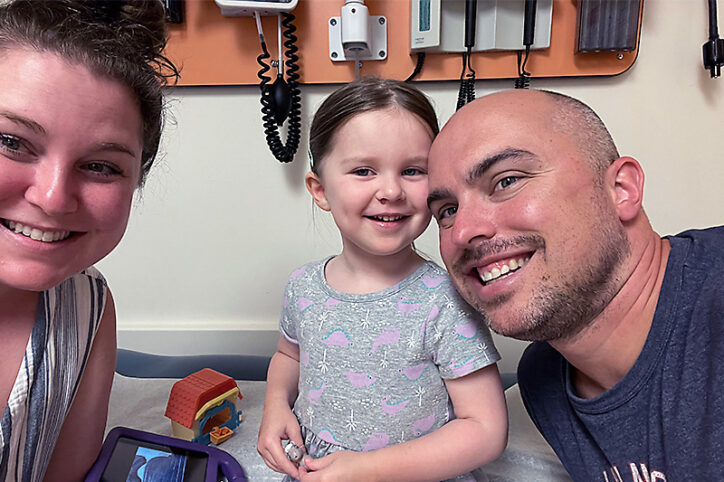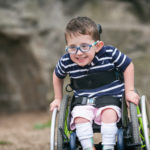The power of a second opinion for Merritt’s spina bifida care

In March 2020 — at the height of the COVID-19 lockdown — Jenna, Brian, and their 2-year-old daughter Merritt were practically the only passengers on their flight from Charlotte to Boston.
Waiting for them in Massachusetts were Dr. Benjamin Warf, Dr. Carlos Estrada, and other experts from the Spina Bifida and Spinal Cord Conditions Center at Boston Children’s Hospital. They were ready to address her rare form of spina bifida known as lipomyelomeningocele, a fatty mass attached to the spinal cord.
Despite the unknowns of the pandemic and occasional doubts about canceling Merritt’s scheduled surgery in North Carolina, just days away, Jenna and Brian knew bringing her to Boston Children’s was the right thing to do.
“The care that we received at Boston Children’s,” Jenna says, “it saved Merritt.”
One size does not fit all
Merritt’s journey with spina bifida began before birth when doctors discovered a defect in her lower spine indicating spina bifida on Jenna’s 18-week prenatal ultrasound.
“Doctors we saw in North Carolina before Merritt was born said, ‘This is what to expect to see with spina bifida,” says Brian. “But it wasn’t what we were seeing with Merritt.”
Babies born with spina bifida typically show signs in utero, such as fluid on the brain, but Merritt didn’t. Another common sign of spina bifida at birth is a blister-like hole on an infant’s back, whereas Merritt’s lipoma was covered by her skin.
Despite their reservations, Jenna and Brian trusted her local doctors’ approaches to treatment. This included a neurosurgical procedure to detach her spinal cord from the lipoma to improve bladder function after she started experiencing UTIs at just a few months old. However, urodynamics testing to evaluate her bladder, sphincters, and urethra function post-surgery showed that her bladder pressure was increasing, and she eventually developed vesicoureteral reflux, a condition where urine flows backward from the bladder into the ureters and sometimes to the kidneys. Vesicoureteral reflux increases the risk of additional urinary tract infections and kidney damage.
Jenna and Brian were confused as to why Merritt wasn’t getting better and concerned that no one could tell them why. They suspected her situation was more severe than they had initially thought.
In late 2019, Merritt’s urologist recommended a vesicostomy to help protect her kidneys by creating an opening from her bladder to the outside of her body. But by then, Jenna and Brian had decided to investigate their options.
“We had read about people who had done online second opinions through Boston Children’s,” Brian says. “So, we thought, why don’t we do that before we move forward?”
They were put in touch with Dr. Estrada and immediately felt comforted by his understanding of Merritt’s specific situation. Dr. Estrada also shared his experience of seeing children with similar diagnoses as Merritt whose spinal cords remained tethered even after surgery, and his belief that a vesicostomy wasn’t necessary.
“Dr. Estrada told us, ‘Come up here, I think we can help,’” Brian recalls. That’s when they canceled the vesicostomy and flew to Boston.
Specialized, comprehensive, and timely care makes a difference
The collaboration at the Spina Bifida and Spinal Cord Conditions Center was evident as soon as they arrived in February 2020.
Dr. Estrada reviewed Merritt’s updated urodynamics testing performed at Boston Children’s and recommended she see Dr. Warf, director of neonatal and congenital anomaly neurosurgery, that afternoon.

“Dr. Warf walked in the room and almost immediately determined that Merritt’s spinal cord hadn’t been effectively treated, and we needed to do something about it,” Brian says. “We were so happy and excited because we felt like we were finally going to have answers and a plan, but we were also devastated that this had gone on for so long.”
A few weeks later, they flew back to Boston on that nearly empty plane so Dr. Warf could free Merritt’s spinal cord from the lipoma in a meticulous procedure that took nearly eight hours.
“We already loved Dr. Warf for helping our daughter,” Jenna says. “But when he sat with us after the surgery and told us he was happy with how everything went, we just felt this intense connection to him.”
Almost immediately after surgery, Merritt’s bladder pressure decreased, and her urodynamic testing results improved. However, Merritt had suffered damage to her left kidney due to the prolonged condition. To safeguard her remaining kidney function, Dr. Estrada and his team performed ureteral reimplantation surgery a few months later to reposition and reattach her ureters to her bladder in a way that would prevent urine from flowing backward.
Merritt returns to the Spina Bifida and Spinal Cord Conditions Center yearly for urodynamics testing and to meet with the team, including Dr. Warf, who monitors how her spinal cord is adapting to her growth and assesses any need for future surgeries. As she grows, so does her sense of agency and involvement in her own care.
“She’s become interested in her story, who her doctors are, and why we come to Boston Children’s,” Brian says. “I tell her, ‘We go because they’re the absolute best in the world and we want you to have the absolute best care in the world.’”
Thanks to instincts, Merritt’s thriving
Today, Merritt’s not only curious and independent, she’s also a happy and very sassy first grader who loves school, dancing, her friends, and her little sister.
“She’s thriving,” Jenna says. “It’s such a beautiful thing to see.”
“Boston Children’s played a huge role in getting her to this point,” Brian adds. “And it all goes back to that decision to seek a second opinion.”
Learn more about the Spina Bifida and Spinal Cord Conditions Center and the Second Opinion Program.
Related Posts :
-

A seat at the table: One family's story of finding advanced care for hydrocephalus
To her parents, everything about 6-month-old Stella is a miracle. Rose and Vlad were ecstatic to learn they were expecting ...
-

‘Part of the process’: How a second opinion helped Wynn take control of bladder function
Wynton “Wynn” Smith-Webb is “the most inquisitive kid you’ll ever meet,” laughs his mother, Amber. At just 3 years old, ...
-

Another level of gratitude: Spina bifida care for Liam
Most parents first walk through the doors of Boston Children’s Hospital seeking answers about their child’s health. But ...
-

'Life-changing' appointment helps Georgia cope with motility issues
Five-year-old Georgia MacAloney loves dancing, cheerleading, and riding her bike. “She’s just a happy, regular kid,” says her mother, ...





